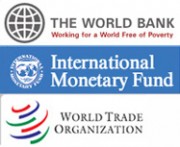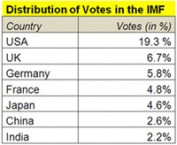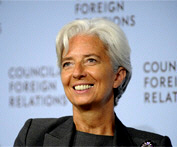WORLD BANK(WB), INTERNATIONAL MONETARY FUND (IMF) AND WORLD TRADE ORGANISATION (WTO) ARE THE PROMOTERS OF NEO COLONIALISM.
by Ac. Krtashivananda
IMF and WB were set up at the end of World War II at Bretton Woods USA in 1944. After the war, USA emerged as a successful victor in political and economic terms. The USA was looking for new growing markets and sources of raw material. Simultaneously freedom struggle against colonial countries were gaining momentum in third world countries. When colonial countries realised that they cannot reverse the urge for political freedom of third world countries, they devised a process with USA as the leader for economic control of the developing countries.
 The IMF started its operation in 1947 while the WB commenced its operations in the year 1946. These two institution with guidance of USA developed a new economic order based on free trade and free enterprise. These institutions closely follow a carrot and stick principle- without IMF membership no admission to the WB. Without conforming to IMF rules no development aid from the WB.
The IMF started its operation in 1947 while the WB commenced its operations in the year 1946. These two institution with guidance of USA developed a new economic order based on free trade and free enterprise. These institutions closely follow a carrot and stick principle- without IMF membership no admission to the WB. Without conforming to IMF rules no development aid from the WB.
The IMF does not follow the rule of one country-one vote system. It operates on weighted vote system. Votes are allocated according to the amount of money each country has paid into the Fund , which is know as Quota. This system guarantees the dominant influence of industrialised countries, particularly USA, in the decision making.
 Some minor changes in voting pattern might have happened recently, but the main criterion is that the lions share of vote is alloted to five industrial countries, led by USA, and USA can bloc any major changes in policies because such a change would require 85% of majority.
Some minor changes in voting pattern might have happened recently, but the main criterion is that the lions share of vote is alloted to five industrial countries, led by USA, and USA can bloc any major changes in policies because such a change would require 85% of majority.
Now the standard prescription of IMF and WB later enforced by WTO also is as follows:
- Devalue the currency
- Decontrol the flow of money and goods
- To treat foreign and domestic companies equally
- Selling of govt. control enterprises to multinationals( both foreign and domestic)
- To change the patent law in favour of big companies and to the disadvantage of the smaller pharmaceutical companies causing increase in prices of drugs in developing countries.
There is a false notion that devaluation enhances export for developing countries because lesser price of goods in domestic sphere. On the contrary, the devaluation leads to drainage of economy and causes disadvantage to the countries which have shortage of foreign currency reserve.
Let us take the case of India as an example:
As far as the market is concerned is concerned G-8 countries control 50% of the market, whereas India’s share is only 0.7%. Since 1991 World Bank and IMF others started to control the exchange rate.
In the year 1999, for example exchange rate in India was about Rupees 43.33 for a dollar( not much different
now).
But considering the the purchasing power of the dollar purchased by India from world market, the consumer goods purchased from world market by 1$ is worth Rs. 9.07. In reality the exchange rate of dollar to rupees should have been $1- RS 9.07. But due to higher price of dollar, India had to pay 4.78 times more money in terms of rupees to purchase 1 dollar from International market. Due this business practice, India (and naturally other developing countries) was always in the receiving end in competitive market.
As a result in the year 1999-2000 total export from was Rs1629,250 million but in return the money received in dollar was equivalent to Rs. 37,600 million. Considering the parity price that is 1$- Rs. 9.07 India should have received 179,63 billion dollar. That means the loss was 142,03 billion dollar in that year. In ten years it must have been ten times more with minor variation.
This trend of unfair business practice is an ongoing affair to restore economic control of the country with tacit support of political and business leaders of the country.
This is Neo-colonialism.

